CYHSB WEEKLY
Cooper Yeshiva High School for Boys
Volume 18, Issue 4

A Deeper Look Into Cooper Macs
Basketball

Page 3
Cooper Clicks
Page 4
YUNMUN: Students on the World Stage
Page 5
Modern Day Heresy: Analyzing Rambam (Part two)
Page 6
This week’s issue was sponsored by Dr. Ari and Mrs. Shana Lowell in memory of Leah Bat Moshe and Chava Rachel Z”L
Contact Nadav Lowell at nadav.lowell@mhafyos.org if you want to sponsor an issue.
2023 Memphis Mayoral Candidates
Candidates of the upcoming mayoral race (lef to right); Paul Young, Van Turner, Floyd Bonner, Wilie Herenton
Mayoral Race: Memphis Braces For Change
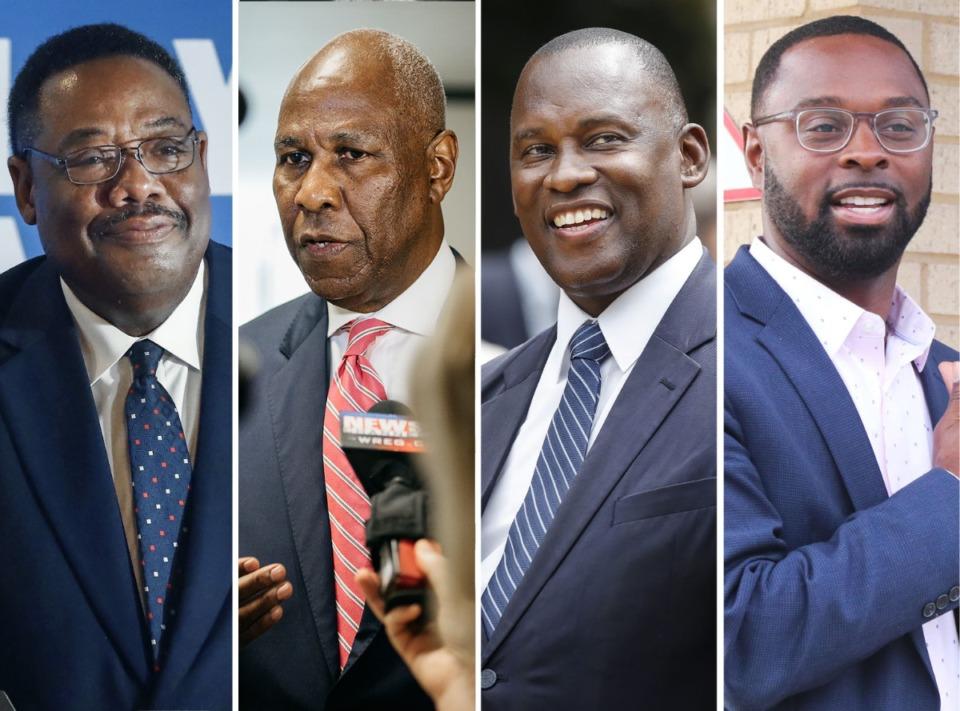



Nadav Lowell (25’) Crisis management, legislative initiatives, economic development, policy implementation, and chief executive officer. These are just some of the stripes on the hat of the Memphis mayor. Dating back to Marcus Winchester in 1827, Memphis has seen the back of over sixty mayors from a host of demographics and backgrounds. Poverty, crime, drug misuse, and urban abandonment are among the city’s largest problems and beg the
question: who will step up to fix them? With the city’s mayoral election coming up on October 5th, the city looks towards the new man for the hot seat.
With 17 candidates in the 2023 race, we must narrow the viewing field to the most likely of the candidates.
Sheriff Floyd Bonner Jr. has a long history of serving Memphis and Shelby County. He became the 47th Sheriff of Shelby County in 2018 and was re-elected in 2022. Sheriff Bonner, a lifelong
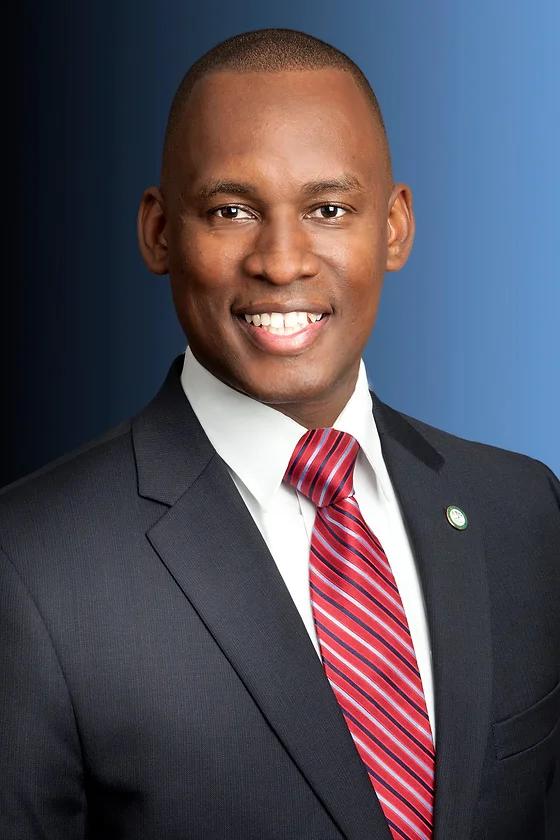
Volume 18, Issue 4 September 29, 2023 CYHSB Weekly 1
Cont from last page: Memphis resident and a second generation law enforcement officer, has a deep understanding of the importance of community service. His educational background includes degrees in Psychology and Criminal Justice. With extensive experience in various roles within the Shelby County Sheriff's Office, he is well-prepared for leadership.
Paul Young has dedicated the past decade to enhancing the quality of life in Memphis. He currently serves as the President and CEO of the Downtown Memphis Commission, where he has played a role in the city's economic and community development efforts. Young proposes making strategic investments in public safety, infrastructure, and community partnerships. His goal is to bridge divides in Memphis, creating a city that benefits all its residents.
Willie Wilbert Herenton is a prominent figure in Memphis politics, having served as the city's first African-American Mayor for five consecutive terms before resigning in 2009. His legacy includes significant achievements such as bringing professional sports teams to Memphis and transforming public housing and charter schools. While Herenton's methods and statements have sometimes generated controversy, his unwavering determination to break barriers remains a defining characteristic.
Commissioner Van D. Turner is a seasoned attorney and dedicated public servant. He was elected to the Shelby County Board of Commissioners in 2014 and subsequently re-elected in 2018. Turner possesses a strong
background in law and government relations. His involvement in various legal and civic organizations, coupled with his leadership role as President and CEO of Memphis Greenspace, Inc., reflects his commitment to driving positive change in Memphis.
A Nonpartisan Race. Memphis elections are described as "nonpartisan races," which means that candidates running for city offices, such as mayor or city council positions, do not officially represent or identify with any political party during their
campaigns. In other words, they do not run as Democrats, Republicans, or members of any other political party. Instead, nonpartisan elections focus on the qualifications, ideas, and character of the candidates themselves rather than their party affiliations. This is in contrast to partisan elections, where candidates are associated with and supported by specific political parties, and their campaigns often revolve around party platforms and ideologies. In nonpartisan races, the goal is to promote a more independent and community-centered approach to local governance. Voters are encouraged to evaluate candidates

based on their individual merits, track records, and proposed policies rather than relying on party labels No runoff? In Memphis, mayoral elections are nonpartisan and lack a runoff system. This means that in a scenario with a high number of candidates, like the 17 candidates this year, it's conceivable for a candidate to secure victory with just 15% of the vote. In such a crowded field, the vote tends to become fragmented, making it difficult for any single candidate to achieve an outright majority (50% or more) of the total votes. Instead, the candidate who garners the highest percentage of votes, even if it falls below 50%, is declared the winner. While this electoral system is not uncommon in nonpartisan races, it can lead to situations where the winning candidate represents a relatively small portion of the electorate, sparking discussions about the breadth of their mandate from the voters. Memphis does not employ a runoff system or a similar system to address this issue, meaning that the candidate with the most votes, regardless of whether they have a majority, becomes the mayor.
With the election just a week away, Memphis residents must carefully assess candidates based on their qualifications, policies, and dedication to the community. The outcome will determine the city's future in addressing these pressing issues and creating a better Memphis for all. The decision now rests with the voters, and their choice will shape the city's path.
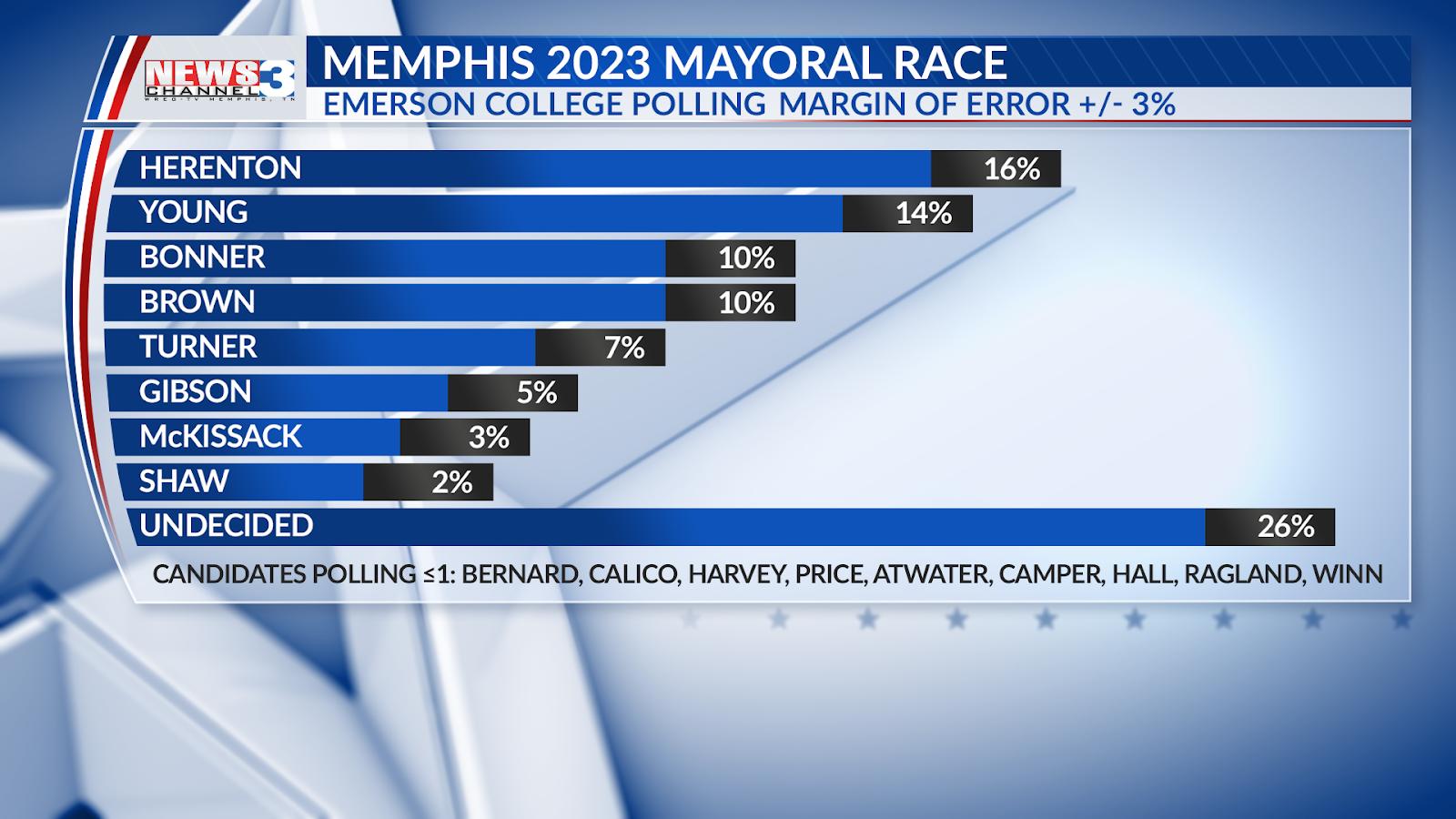
Volume 18, Issue 4 September 29, 2023 CYHSB Weekly 2
Latest poling data for the Mayoral vote. Source: wreg.com
A Deeper Look Into Cooper Macs Basketball
Benny Freiden (’26) School is back in session which means the return of our favorite sports. One of our fan favorites is the Cooper Macs basketball team. Basketball season is right around the corner and the team just started practicing this past week.
The Macs have lost a few key players but gained a few freshmen for the 2023 season. Yosef Vanderwalde, Avi Becker, Yitzchak Rubin, and Adam Felsher guide the team as seniors this year. Rafi Goldkin and Ethan VanderWalde make up the juniors, with Jack Kampf and Benny Freiden representing the sophomores. The freshmen coming in are Jonah Siegel, Eli Weisfogel, Daniel Kahane, and Ilan Lennon. Senior forward Yosef Vanderwalde said “I am very excited for the basketball season to start. With the help of our new coaches, we are determined to win. I am looking forward to being a leader on the team as a senior and helping make sure this season is a success.”
Last Week’s Solution

Freshman guard Jonah Siegel said, “I can't wait to have some fun and win some games this season. It's a hard switch going from 8th grade to Varsity but I'm excited for the challenge.“
With all the holidays coming up, it makes it tough to schedule regular practices. The team's coaches are doing their best to get in as many practices as possible before the first game of the season. The Macs are preparing to play against rival schools old and new for the 2023 season. We expect the returns of teams such as Crosstown and Westminster, as well as unseen teams like Desoto Christian and Tipton Rosemark. It will be fun to see how the Macs match up against these teams they didn't get to play last year.
Along with the regular season, the Macs will be participating in Yeshiva University’s Sarachek Tournament. Despite not winning a game in last year's competition, the team had a fun time and can’t wait to go again this year. Sophomore guard Jack Kampf said “I am excited to contribute to the team this season. I think that we will work together to pick up some wins at Sarachek this year.” The Macs will also be participating in the Cooper Tournament right here in Memphis. The Cooper tournament is back for the first time since 2019 and the hometown Macs plan on picking up some wins. The Annual Alumni game will happen again this year in which the alumni of the school play the Cooper Macs in the annually awaited matchup.
With all these tournaments right around the corner the Macs have been fundraising to help pay to
compete. Most recently, the Macs sold fruit platters for Rosh Hashana. They sold over 20 platters and made more than expected, but still that money only scratches the surface of the goal value. The Macs are selling fruit platters again for Sukkot. Keep your eyes peeled for more Mac’s fundraisers that come up throughout the year.
In most Jewish schools, It's difficult to make varsity and many kids don't get the chance to play high school basketball. At the Cooper Yeshiva, every kid gets the chance to play and still competes at the level of larger schools with upwards of 500 students. This season should be a fun one as I know everyone is excited. Come out to our games this year and support your Cooper Macs!
Volume 18, Issue 4 September 29, 2023 CYHSB Weekly 3
The basketbal team works together to make delicious f uit platters. Photo by: J.J. Stein
Cooper Clicks
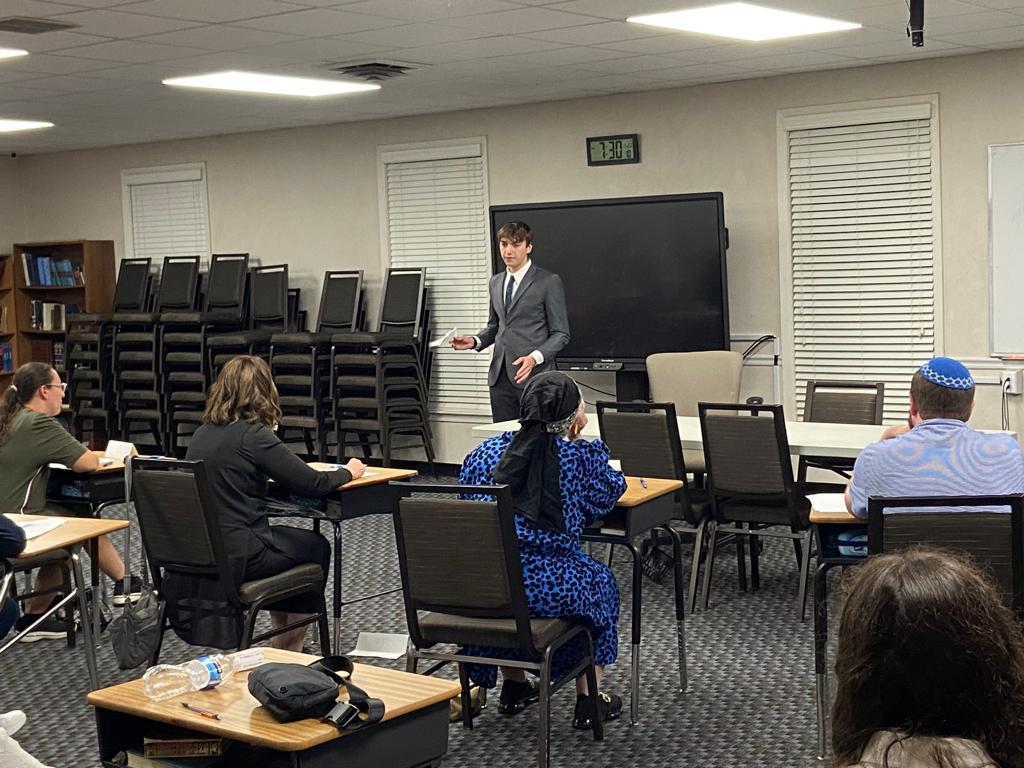

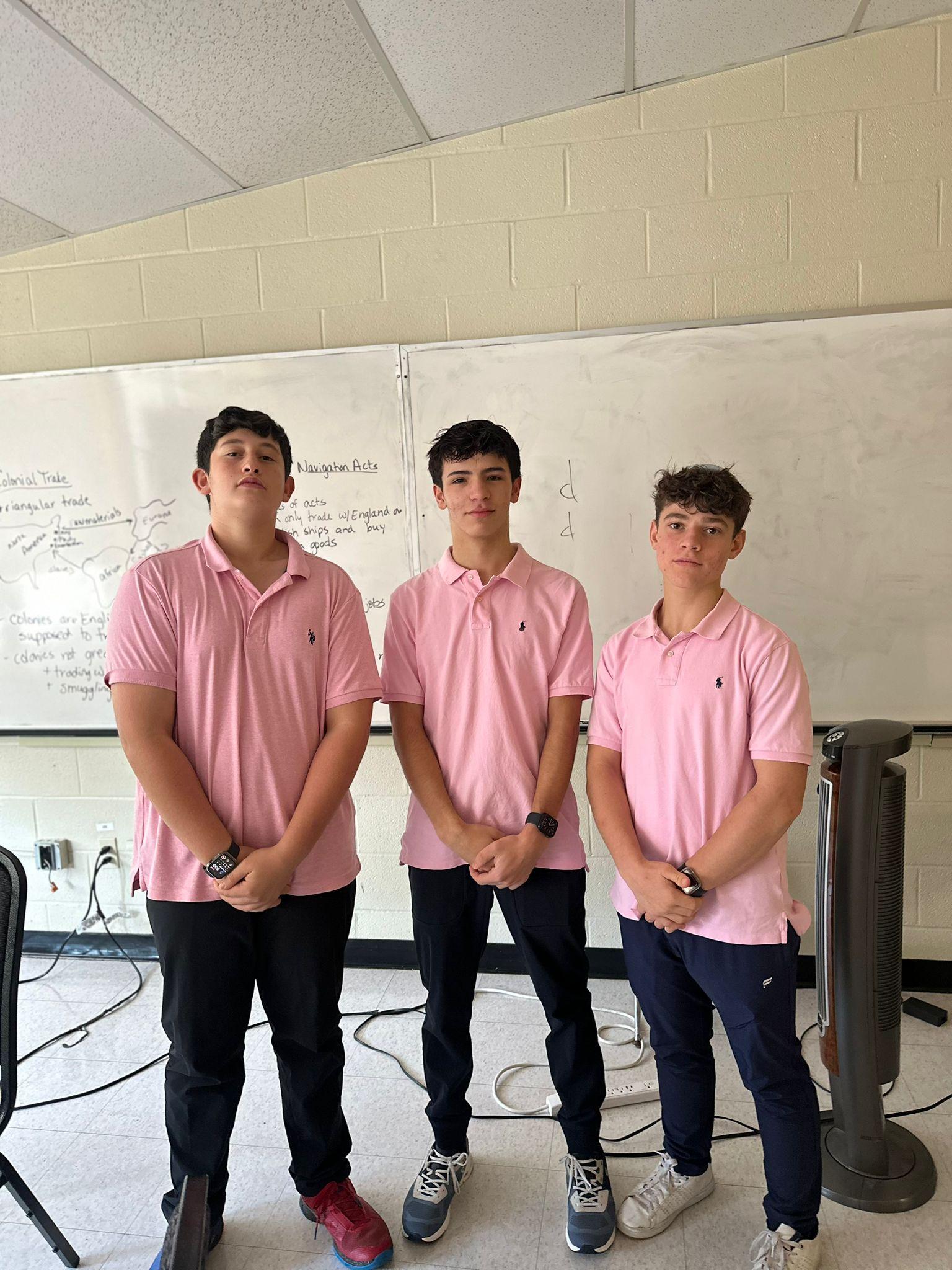
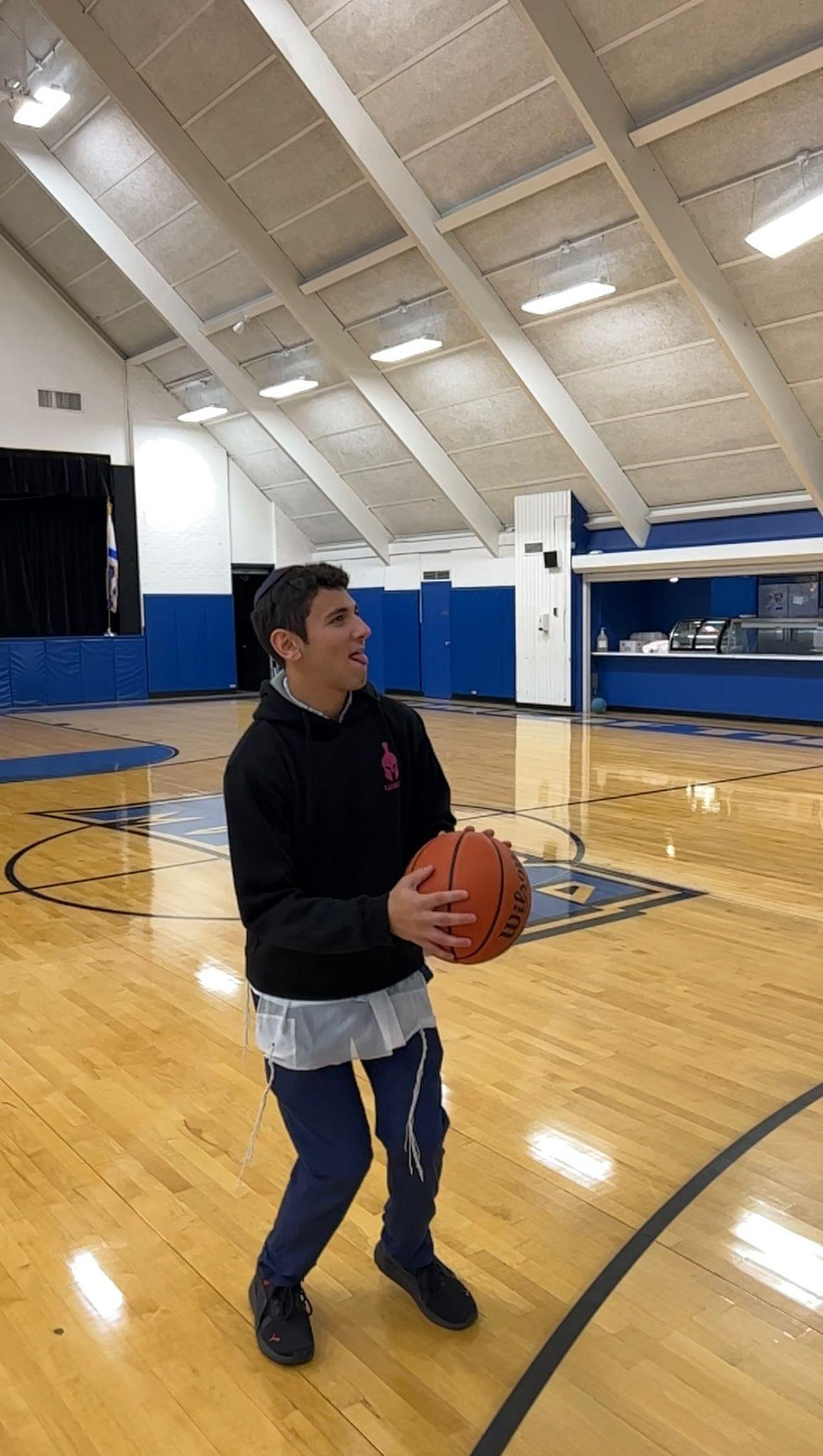

Top Right: Avi Becker fails in attempt to lick basketball. Top Left: Eli Weisfogel flies into fit of rage attempting to destroy dropped orange. Bottom Right: Oops, all berries! Bottom Left: Jojo Ardestani pitches his new restaurant idea to investors. Reach out to him for more information with his email which can be found in the staff section on the back page.
- CALVIN AND HOBBES © Watterson. Reprinted with permission of ANDREWS MCMEEL SYNDICATION. All rights reserved.




Volume 18, Issue 4 CYHSB Weekly 4
YUNMUN: Students on the World Stage Stepping Into YUNMUN
Last Week’s Solution

represent during the tryout process. My country was Sudan. At the time, the only piece of knowledge I knew about Sudan was that the capital was Khartoum and i was in Africa. I didn’t know what to do, so I decided to ask Amit, my brother, for help. He told me to copy important inscriptions from reliable sources, such as UNHCR, World Bank, and Britannica. I took the information and crafted an outline, and at last, all I needed to do was to merge it all together into a speech, which came after about two hours. Unfortunately, at this time, procrastination had hit me. It was the 10th of September, and I sat in my room wasting time. I had completely forgotten about YUNMUN, and every day, Amit would remind me to memorize and learn my speech, as I sat at my chair, daydreaming and procrastinating, until four days later, when I decided to learn my speech, I said and reiterated my speech over and over, until I knew every single word. By Shabbos, I knew my whole speech and was ready to learn my information. So on Monday, the day before the tryouts, I went to a few YUNMUN captains, Raanan VanderWalde and Ethan VanderWalde; I asked them for tips about everything, and they helped me prepare for the conditions at tryouts. Soon after this, I had amalgamated all the information, into a Quizlet study guide to help me study.
During the last remaining hours before tryouts, I decided to study both my speech and all of my information during
the school day, my quote was “Every second counts”, and during breaks, I would rehearse my speech and learn more information. I practiced until the last 30 minutes. At 6:30, I realized that I had never gotten a suit, and I rushed home, I ate dinner at world record time, and put on clothes at the speed of light. At 6:45 PM, I returned to school.
I walked into the room. Everyone was perfectly silent. It had started, the captains walked towards the front of the board and explained that we would go in turns. After 14 speeches and questions from the judges, it was my turn. Since I had memorized my speech, and knew a modicum of
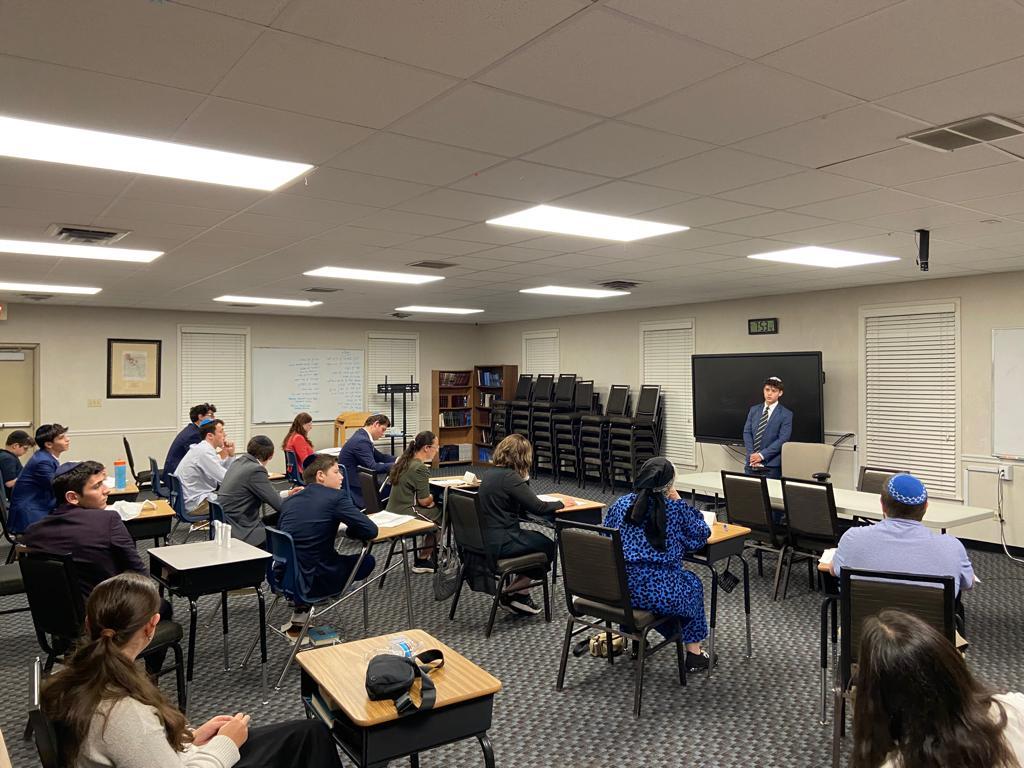
Raanan
knowledge about Sudan. I was ready, I walked toward the board, and said my speech, it was perfect, I had no pauses; but now I was given a few questions to answer, after a few seconds, I was given: “Given the current situation in Sudan, how does Sudan manage their refugees?” After hearing this, my eyes lit up, I knew the answer to this, and I gave a concise and short answer. After answering the question, the judges couldn’t formulate a question to give me, so I only got one. At that moment, I was so happy, I gave a perfect speech, and answered the question perfectly, and I walked off stage, smiling the whole way to my seat.
YUNMUN: In a Nutshel
Vanderwalde (25’)
Every year, Yeshiva University hosts a national model United Nations called YUNMUN. This country-wide, threeday conference takes place in early February and gets participants from almost every major Jewish day school in the country. Our school team is made up of around 12 participants, called delegates, who will fly in February to represent our school in the annual event.
At the YUNMUN conference students are presented with the task of representing a country. For example, in past years our school’s delegates had to represent the country of The Netherlands. Each student is assigned to their own committee, which has a topic of debate, in which there are 20-30 delegates from a variety of schools who are representing different countries, but all discussing the same topic. For example, a delegate from
the Netherlands to the UNEP committee (United Nations Environment Programme) might have to debate with other countries' delegates about the pressing climate change issues. Each committee has chairs, who are the judges that determine which delegates receive awards. Therefore, it is the goal of all the delegates to try their best to receive these coveted awards.
While the conference is incredibly fun, months of research are required to prepare for the event. From now until February, students will be preparing for the conference, doing everything from writing speeches, to researching topics and practicing the procedure of the conference. Running the team is Ms. Tsuna and the four captains, are Raanan Vanderwalde (25’), Ethan Vanderwalde (25’), Nadav Lowell (25’), and Shoshana Kaplowitz (24’).
CYHSB Weekly 5
Ilan Lennon delivering his YUNMUN tryout speech Photo by: Mrs. Tsuna
Modern Day Heresy: Analyzing Rambam (Part 2)
Avi Becker (’24)
On Rosh Hashana, we discussed Rambam's view of faith and heresy within his era. However, now we must apply this to contemporary heresy. This dvar is a continuation of the Rosh Hashana dvar Torah, so although an excerpt of the last paragraph will be placed below as a refresher, to fully ascertain the concepts discussed, one might find it helpful to read the previous dvar Torah if this hasn’t already been done.
Rambam’s answer does not seem to correspond to the assumption made in the first approach that such a person’s exclusion from the next world is a natural consequence. If the first approach was correct Rambam should have responded that olam haba is by definition impossible for someone with an incorrect conception of G-d. Instead, Rambam answers that the person is in fact to blame for his erroneous beliefs. The implication is that he is considered a heretic because of his negligence. Thus, Rambam appears to distinguish between the second-generation Karaite who is blameless and therefore excused, and the corporealist who is negligent and therefore culpable.
Last Week’s Solution

If the above theory is indeed correct, applying Rambam to contemporary heresies would mean determining whether someone who denies one of Rambam’s thirteen principles is blameless or negligent today.
R. Elchanan Wasserman addresses this very question with respect to belief in G-d.
“I have heard in the name of R. Chaim Soloveitchik of Brisk regarding the view of Rambam that all heresy is not considered shogeg (accidental) because in the final analysis, he does not have emunah, and it is impossible to be part of the Jewish people without emunah… Seemingly, his view is compelling, because all heretics and idolaters err only unintentionally. There is no greater mistake than someone who offers his son to molech, and yet he is liable for
execution (i.e., we don’t treat him as shogeg even though his sin does not seem like a willful rejection of the truth but a misunderstanding of the truth). [Rather, it must be the case that lacking faith automatically excludes a person from the Jewish people.)”
But we cannot conclude that someone without faith automatically is excluded from the Jewish people, because a baby also does not have faith, yet he certainly is part of the Jewish people. Likewise, a baby taken captive by idolaters brings a sacrifice for his sins (i.e., he is considered a shogeg), and he is not treated as an apostate. From here we see that we apply the principle that “G-d excuses all those coerced” even to matters of faith. (This seems to contradict R. Chaim.)
The answer is in accordance with what we explained earlier, namely, that the principles of faith are in and of themselves simple and compelling. It is only a person’s desire to throw off G-d’s yoke that causes his intellect to err and deny that which is obvious. Accordingly, such errors are considered intentional violations. But someone who [believes in G-d and Torah, but] says that it is permissible to serve idolatry is considered shogeg and exempt from execution, since he thinks that his acts are in accordance with the Torah (i.e., he is not denying Torah)”
He questions the possibility of such a person existing where they could remove any culpability. Clearly any person who cares would put some effort into searching and thereby ascertaining the truth.
Many would consider, however, his opinion to be far removed from the concerns of an average person. His complex quote could not deny this error any more, though. R. Elchanan only arrives at this conclusion after considering a number of basic questions. R. Elchanan wonders how the Torah could legislate belief in G-d if such belief is not in a person’s control. Moreover, knowledge of G-d’s existence clearly
is not achieved so simply; after all, someone as wise as Aristotle did not maintain correct beliefs in this regard. How can the Torah demand that every Jewish thirteen-year-old have this belief? No one would expect such. The answer, R. Elchanan asserts, is that anyone who considers the matter honestly will arrive at the truth of Gd’s existence. Likewise, Rambam holds the “innocent” heretic responsible for his negligence because he is not really innocent; he could have known better. How does a person turn to heresy; what causes man to err? His desires and passions: one must be motivated, whether consciously or not, to take favor in falsity.
R. Elchanan follows the latter and does not believe that idolaters or heretics are conscious of this motivation. Rather, as the Gemara (Sanhedrin 63b) states concerning idolatry – which people served with devotion and sacrifice –subconscious forces often produce skewed decisions. Nevertheless, even if a person is unaware of his motivation, he is held accountable to
Volume 18, Issue 4 September 29, 2023 CYHSB Weekly 6
Rav Elchanan Wasserman; Source: wikipedia.com
Cont. from last page: the degree that he had the ability, through contemplation and introspection, to arrive at the truth. If not, at least not the incorrect idea.
Indeed, Rambam (Moreh haNevuchim 1:5) warns that temptation can unknowingly cause error. Only when a person’s singular desire is the quest for truth will he be largely protected from error. As long as a person simultaneously craves other things, such as lust or honor, these desires may cloud his judgment and lead him to justify the false beliefs necessary to achieve his yearning. Rambam emphasizes that left unchecked, desires pervert our intellectual reasoning. A person may think they are seeking the truth, but, in fact, they are only justifying their agenda. Thus, to correctly apprehend the truth, one must first rid themselves of this sort of desire. To seek truth for the sake of truth. While difficult, Rambam maintains that with hard work a human being is capable of reaching this state. Therefore, the true error is none of the aforementioned, but rather the lack of devotion toward the goal of truth.
Last Week’s Solution
One might question, however, whether this concept holds true in the modern age. R. Yehuda Amital questions this answer, putting forth that there are those who seek truth and arrive at false conclusions, which we see all too often today. We see consistently, that even those who desire a G-d, seem to reluctantly live in a world where they don’t believe in him. To this extent, R. Elchanan’s argument could not be further removed from reality. Beyond even that, R. Elchanan’s theory seems to be incapable of holding up to the test of all 13 principles.
Firstly, why should desires trigger a denial of G-d’s incorporeality? A person who believes in a physical God may still punctiliously observe the Torah. Moreover, even if we accept that the honest searcher always concludes that G-d exists, will he
always conclude that there will be a resurrection or that every word in the Torah comes from G-d? Belief in G-d can, to some extent, be shown logically. Not so concerning the resurrection.
There is a matter that pains the hearts and distresses the mind so much so that in every generation, people are drawn to absolute heresy from it alone. And it is seeing injustice, the righteous suffer and the wicked prosper… This is the root of all remissness from every nation and every language.
Ramban implies that it is both witnessing as well as the philosophical problem of evil itself and not the greedy desire for pleasure that leads to heresy.
To this, R. Elchanan responds that the honest search concludes not just in the necessity of G-d’s existence, but in the veracity of the Torah. This second component demands belief in all thirteen principles. However, even R. Elchanan concedes that concerning certain beliefs, we allow for tinok shenishba when it comes to reasonable errors The question then remains: to which principles are we willing to apply this exception? Perhaps as the world becomes more secular, the list expands.

Despite the seeming cogency of R. Elchanan’s argument, other great thinkers still disagree. In Ramban’s Introduction to his commentary on Iyov, he notes that the primary reason why people would deny G-d’s existence or His providence is suffering and the problem of evil. Witnessing or experiencing agony is not only painful but the primary cause of heresy:
Along similar lines, R. Sa’adya Gaon considers the various causes for heresy, outlining eight specific ones. Like R. Elchanan, many stem from intellectual laziness, justification of a life free of obligation, and arrogance. Presenting a life that, despite lacking purpose, lacks excessive responsibility. However, R. Sa’adya Gaon also considers the possibility that a person’s rejection stems from the lousy arguments sometimes offered by believers and incoherent defenses of religion. R. Sa’adya Gaon appears open to the possibility that the root of heresy is sometimes intellectual. Accordingly, in his work, Gaon seeks to correct these errors. His work might too be seen as more relevant as the time he lived was filled with people, who like our era, struggled with a belief.
The above two sources do not address the question of whether the denier should be blamed, they simply observe the complexity of disbelief. Another earlier commentator who appears to have a radically different position than R. Elchanan is R. Abba Mari ha-Yarchi, in Minchat Kena’ot Ch. 14 (Mossad ha-Rav Kook ed. Teshuvot ha-Rashba Vol. 1, p. 257). In discussing the heresies of Aristotle, he writes that Aristotle himself was not at fault for his heretical beliefs because he could not have known better. However, he was not discussing Aristotle alone, but rather all those who went to seek truth and found something else.
Volume 18, Issue 4 September 29, 2023 CYHSB Weekly 7
The Rambam Source: etzahaim.org
Good Shabbos!
Wishing everyone a ַחֵמָש גַח and a great Succot break!
CYHSB Weekly Staff
Editor-in-Chief
Ezra Davidovics | ezra.davidovics@mhafyos.org
Associate Editor-in-Chief
Nadav Lowell | nadav.lowell@mhafyos.org
Managing Editor
Raanan Vanderwalde | raanan.vanderwalde@mhafyos.org
Head of Torah Affairs


Avi Becker | avi.becker@mhafyos.org
Layout Editors
Amit Zalman | amit.zalman@mhafyos.org
Rafi Davidovics | rafael.davidovics@mhafyos.org
News Editors
Joshua Parcover | joshua.parcover@mhafyos.org
Yaron Weiss | yaron.weiss@mhafyos.org
Akiva Levine | akiva.levine@mhafyos.org
Photographers and Complaint Managers
J.J. Stein | jacob.stein@mhafyos.org
Jack Kampf | jack.kampf@mhafyos.org
CYHSB Weekly Staff
Jojo Ardestani | jonathan.ardestani@mhafyos.org
Rafi Goldkin | rafael.goldkin@mhafyos.org
Benny Freiden | benjamin.freiden@mhafyos.org
Ilan Lennon | ilan.lennon@mhafyos.org
Jonah Siegel | jonah.siegel@mhafyos.org
Omer Zalman | omer.zalman@mhafyos.org
Avigdor Zweihorn | avigdor.zweihorn@mhafyos.org
Davi Baum | david.baum@mhafyos.org
Administrative Advisors
Mrs. Ashley Brown
Rabbi Dov Rossman
From the Editor:
With drastic changes throughout the world every day, it’s comforting to see a continuation from the past. Whether it’s basketball team returning for another great season or an insightful Dvar Torah which builds on a previous thought. Building up to Succos we need to seek out both new ideas and past successes to achieve the best for ourselves in this zman simchaseinu
- Ezra Davidovics
Volume 18, Issue 4 September 29, 2023 CYHSB Weekly 8

























